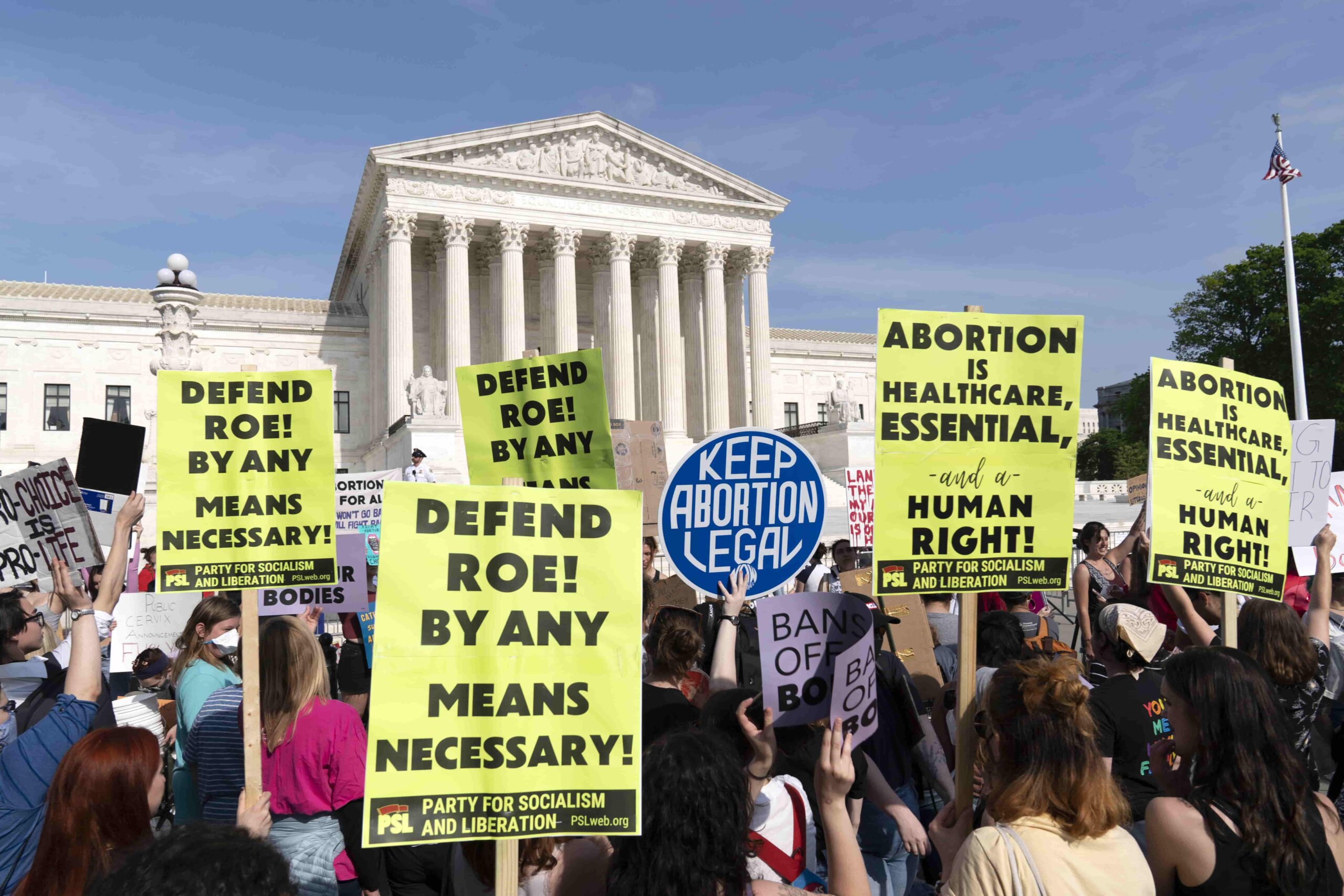A new poll shows the majority of Americans oppose overturning Roe v. Wade as the Supreme Court indicates it’s poised to overturn the watershed abortion rights ruling.
A survey of 1,955 voters conducted by Politico and Morning Consult found that respondents were against the repeal of Roe by a 2-1 margin. Just over a quarter of voters (28 percent) polled on May 3, the day after a leaked draft opinion from Justice Samuel Alito referred to the 1973 decision as “egregiously wrong from the start,” felt the decision should be thrown out. Meanwhile, half of respondents (50 percent) expressed support for the right to reproductive access.
Crucially, U.S. voters across party lines felt that Roe should be upheld by the Supreme Court. Nearly seven in 10 Democrats (68) and slim majorities of both Independents (52 percent) and Republicans (51 percent) wanted to preserve the landmark precedent, which established a right to abortion up to the point of fetal viability.
A small number of respondents—just 11 percent—felt that abortion should be “illegal in all cases,” including when a gestational parent’s life is jeopardized by the pregnancy.
These results conform to previous polling published in the days leading up to the draft opinion’s release, which widely found that Americans support abortion access. In an ABC News/Washington Post survey conducted between April 24 and April 28, 54 percent of respondents said Roe should be sustained, as opposed to the 28 percent who opposed it. Of the 1,004 voters polled, 70 percent said that the decision whether to terminate a pregnancy should be left up to individuals and their doctors.
While many have described the issue of abortion as “divisive,” opinions on reproductive choice have remained extremely fixed over the past three decades, according to ABC News. Fifty-eight percent of voters said that abortion should be legal in all or most cases, which the media organization reports is roughly the average in its polling on the subject since 1995.
Other polls show, however, that Americans might be willing to support some restrictions on reproductive choice. In a survey of 1,003 voters between April 28 and May 1, Fox News found that more than half (54 percent) would back Mississippi’s 15-week abortion ban, the controversial law at the centre of the Supreme Court’s current deliberations. Another 50 percent would be okay with a six-week cut-off for abortions, a time before which many people realize they are pregnant.
A decision on the Mississippi case, known as Dobbs v. Jackson Women’s Health Organization, is expected by the Supreme Court in June or July. According to Politico, Alito will be joined in invalidating Roe by four other justices from the court’s six-judge conservative wing: Amy Coney Barrett, Neil Gorsuch, Brett Kavanaugh and Clarence Thomas. Chief Justice John Roberts is expected to dissent.
Were Alito’s decision, which is not yet final to be published as-is, the ruling would effectively return the issue of reproductive access back to the states. At least 13 U.S. states have trigger laws in place that would ban all abortions immediately if Roe were to be overturned, including Kentucky, Tennessee, Texas and Utah.
Many supporters of LGBTQ2S+ rights in the U.S. are worried about the impact that Roe’s repeal would have on trans individuals, non-binary people and queer women seeking abortions, as well as the future of equality itself. President Joe Biden warned that dismantling reproductive rights could lead to challenges of other historic precedents like Obergefell v. Hodges, the Supreme Court’s 2015 ruling legalizing marriage equality in all 50 states.
“If the rationale of the decision, as released, were to be sustained, a whole range of rights are in question,” Biden told reporters on Tuesday. “Does this mean, in Florida, they can decide to pass a law saying same-sex marriage is not permissible?”
“The religious extremists and their lawmaker allies who helped pack the Supreme Court under Trump are willing to destroy our democracy to force all of us to live by their narrow beliefs.”
With Alito expressing hostility to marriage equality in his draft opinion, pro-LGBTQ2S+ advocates have signalled that further threats to fundamental rights could be coming. GLSEN executive director Melanie Willingham-Jaggers noted in a statement that LGBTQ2S+ people are “disproportionately harmed by abortion restrictions,” while GLAAD CEO and president Sarah Kate Ellis called the potential ruling an “assault on all Americans, especially those of us in marginalized communities.”
Rachel Laser, president and CEO of Americans United for Separation of Church and State, added that overturning Roe would be “just the beginning” of the assault on civil rights for minority groups.
“The religious extremists and their lawmaker allies who helped pack the Supreme Court under Trump are willing to destroy our democracy to force all of us to live by their narrow beliefs,” Laser said in a statement. “They want a nationwide abortion ban. They will come for contraception. They will come for marriage equality and LGBTQ rights. They will come for racial justice. They will not be satisfied until they have codified a white Christian nation.”


 Why you can trust Xtra
Why you can trust Xtra


